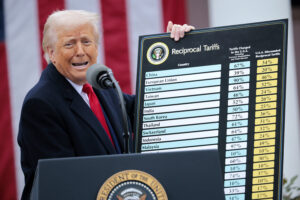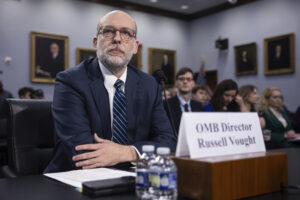The Dictatorship
Trump’s attempt to fire a Federal Reserve governor tests a weird Supreme Court move
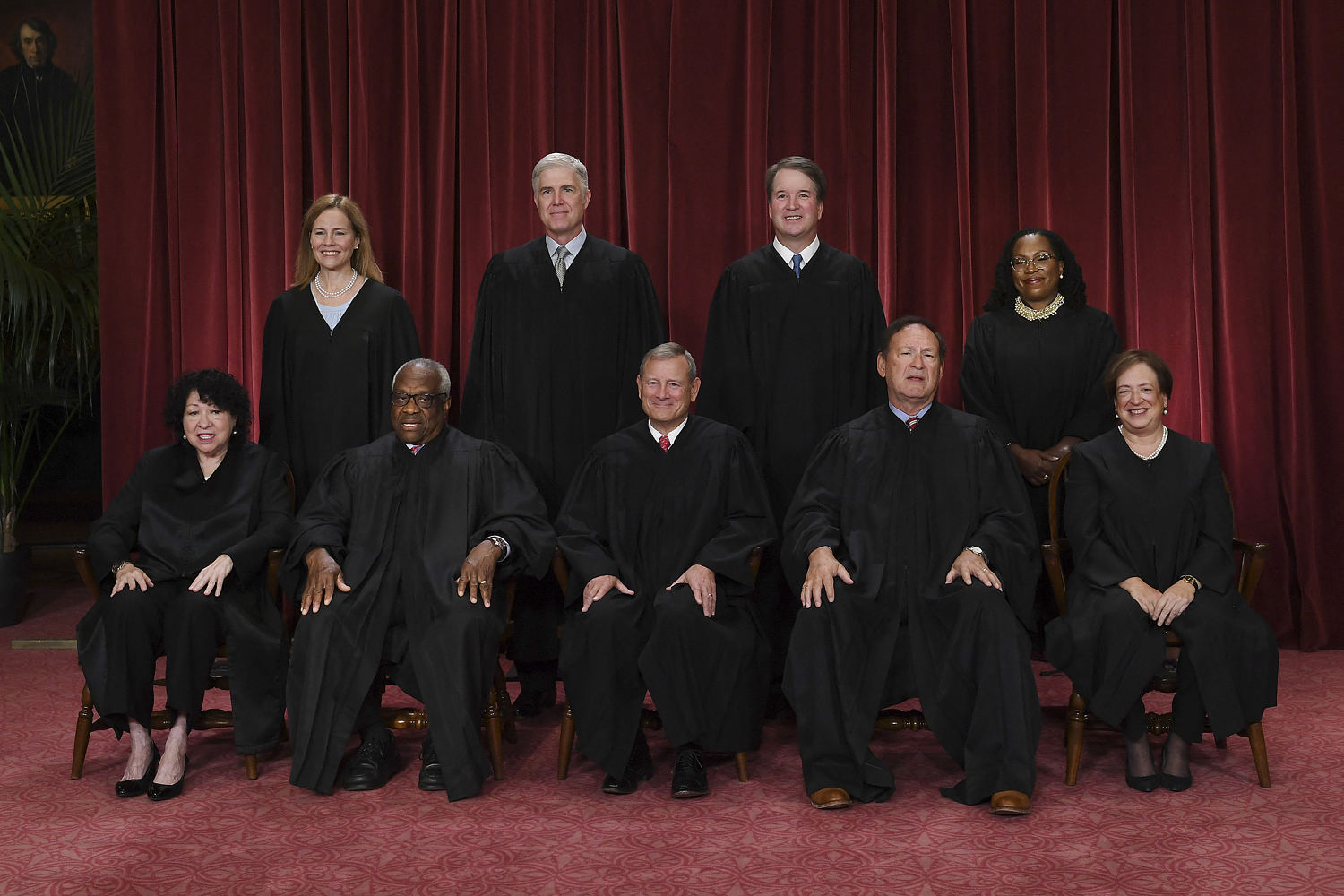
Back in May, when a divided Supreme Court gave President Donald Trump the power to fire members of certain labor boards without cause, the Republican-appointed majority went out of its way to signal its intention to protect the Federal Reserve board, even though the Fed itself wasn’t at issue in that case.
Now, Trump’s attempt to fire Federal Reserve governor Lisa Cook could test the high court’s strange signal.
In that May shadow docket case, Trump v. Wilcoxwhich involved members of the National Labor Relations Board and Merit Systems Protection Board, the majority addressed those board members’ argument that the logic behind stripping their protections would also imperil the Federal Reserve’s independence.
“We disagree,” the majority wrote, citing a previous precedent in noting that the Fed “is a uniquely structured, quasi-private entity that follows in the distinct historical tradition of the First and Second Banks of the United States.”
Dissenting in the Wilcox case, Justice Elena Kagan wrote for the Democratic appointees that she appreciated the majority’s “intention to avoid imperiling the Fed” but that its decision still posed “a puzzle.” That’s because the Federal Reserve’s independence rests on the same foundation as agencies such as the NLRB and the MSPB — which, Kagan pointed out, means it rests on a nearly century-old precedent, Humphrey’s Executor. The Trump administration wants to overturn that 1935 decisionand the majority’s recent rulings on presidential power suggest that it’s on board with that effort.
“If the idea is to reassure the markets, a simpler — and more judicial — approach would have been to” rule against Trump “on the continued authority of Humphrey’s,” Kagan wrote in Wilcox.
But the majority opted against that approach and could soon be in the position of needing to reassure the markets once again.
However powerful Kagan’s criticism of the Wilcox majority was, the fact is that a majority of the court has signaled its willingness to protect the Federal Reserve more than other agencies. With Cook’s lawyer saying she’ll file a lawsuit over her purported removal, the question now is whether that same majority would rule against Trump to save her.
A potentially important factor as the litigation gets underway is that Trump claimed to be removing her “for cause,” citing a criminal referral initiated under his administration. Cook, who has not been charged with any crime, maintains that Trump lacks both a legal and factual basis to fire her.
While it will depend on how exactly Cook presses her legal claim and how the administration defends itself, the case’s resolution could turn on the narrower issue of the sufficiency of cause for removal, as opposed to the justices resolving the outer limits of presidential authority when it comes to the Federal Reserve. Given Kagan’s critique of the logic behind the majority’s Fed carveout in Wilcox (not that the majority has to care about that), the majority might appreciate such narrower grounds as a way of solving the “puzzle,” as Kagan put it, that the court created for itself.
Subscribe to the Deadline: Legal Newsletter for expert analysis on the top legal stories of the week, including updates from the Supreme Court and developments in the Trump administration’s legal cases.
Jordan Rubin is the Deadline: Legal Blog writer. He was a prosecutor for the New York County District Attorney’s Office in Manhattan and is the author of “Bizarro,” a book about the secret war on synthetic drugs. Before he joined BLN, he was a legal reporter for Bloomberg Law.
The Dictatorship
Trump ends ex-Vice President Harris’ Secret Service protection early after Biden had extended it
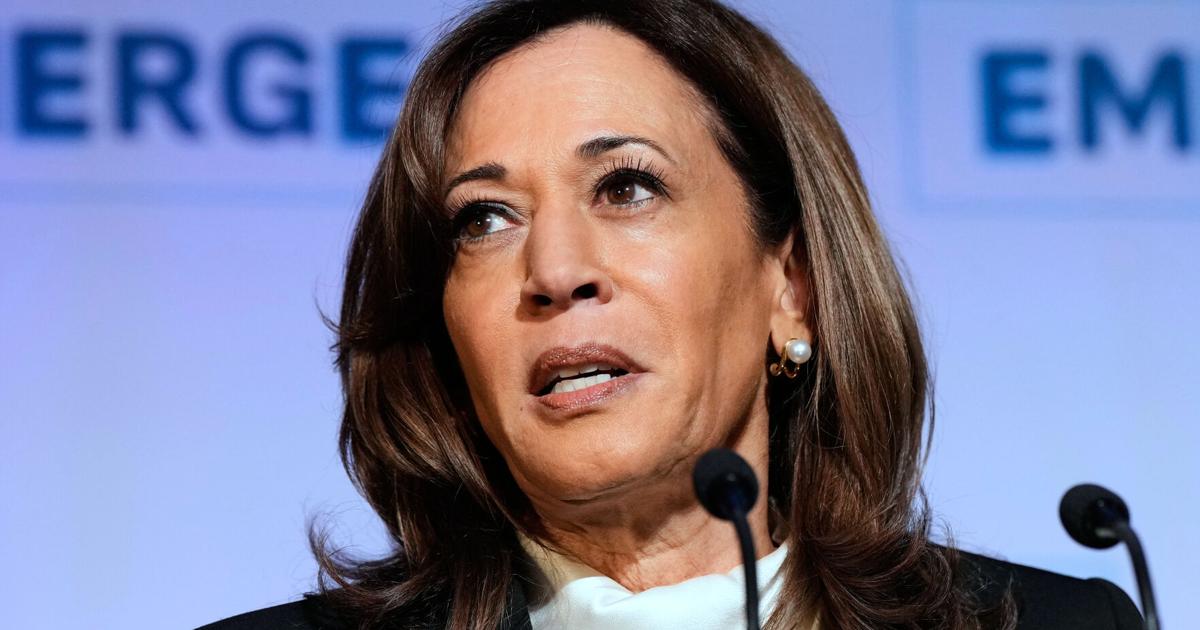
WASHINGTON (AP) — President Donald Trump has revoked former Vice President Kamala Harris’ Secret Service protection that otherwise would have ended next summer, senior Trump administration officials said Friday.
Former vice presidents typically get federal government protection for six months after leaving office, while ex-presidents do so for life. But then-President Joe Biden quietly signed a directive, at Harris’ request, that had extended protection for her beyond the traditional six months, according to another person familiar with the matter. The people insisted on anonymity to discuss a matter not made public.
Trump, a Republican, defeated Harrisa Democrat, in the presidential election last year.
His move to drop Harris’ Secret Service protection comes as the former vice president, who became the Democratic nominee last summer after a chaotic series of events that led to Biden dropping out of the contestis about to embark on a book tour for her memoirtitled “107 Days.” The tour has 15 stops, including visits abroad to London and Toronto. The book, which refers to the historically short length of her presidential campaign, will be released Sept. 23, and the tour begins the following day.
A recent threat intelligence assessment the Secret Service conducts on those it protects, such as Harris, found no red flags or credible evidence of a threat to the former vice president, said a White House official who also insisted on anonymity to discuss internal deliberations. The administration found no reason Harris’ protection should go beyond the standard six-month period for former vice presidents, the official said.
Trump’s vice president from his first term, Mike Pence, did not have extended Secret Service protection beyond the standard six months.
Still, it is not unusual for Secret Service protection to continue well beyond the statutory six-month window, particularly when former officials face credible and ongoing threats. But Trump’s decisions to revoke the protection have stood out both for timing and for targets.
During Trump’s second presidency, he repeatedly has cut off security for adversaries and figures who have fallen from favor, including his onetime national security adviser John Bolton and members of Biden’s family, including the former president’s adult children. Outgoing presidents can extend protection for those who might otherwise not be eligible; Trump did so for his family after leaving office in 2021.
The decision to strip Harris of protection is certain to raise alarms among security experts who view continuity of protection as essential in a polarized climate.
A senior Trump administration official said an executive memorandum was issued Thursday to the Department of Homeland Security ending Harris’ security detail and security services. Those had been extended from six to 18 months by the Biden administration, so they would have ended in July 2026, but now they will be terminated on Monday.
Harris lives in the Los Angeles area. The city’s Democratic mayor, Karen Bass, called Trump’s decision “another act of revenge following a long list of political retaliation” and warned that it would endanger Harris. Bass said she plans to work with California Gov. Gavin Newsom, a fellow Democrat, to ensure the former vice president’s safety, and she and Harris have already been in touch about the issue, according to a person with knowledge of the discussions.
While she lost to Trump last November, Harris is seen as a potential candidate for 2028, and she has already announced she will not run for California governor in 2026. Harris is also a former senator, California attorney general and San Francisco district attorney.
Last year was a particularly politically charged environment with Trump facing two assassination attempts, and the Secret Service played a crucial role in protecting the now-president. While questions remain about how the agency prepared for a July 2024 rally in Butler, Pennsylvania, a Secret Service counter sniper shot a gunman dead after he fired eight shots, killing an attendee, wounding two others and grazing Trump’s right ear. Trump chose one of the agents who rushed to the stage to shield him, Sean Curran, to lead the agency earlier this year.
The news of the security revocation was first reported by BLN.
___
Gomez Licon reported from Fort Lauderdale, Fla.
The Dictatorship
Appeals court rules against Trump tariffs, but Supreme Court appeal may soon follow
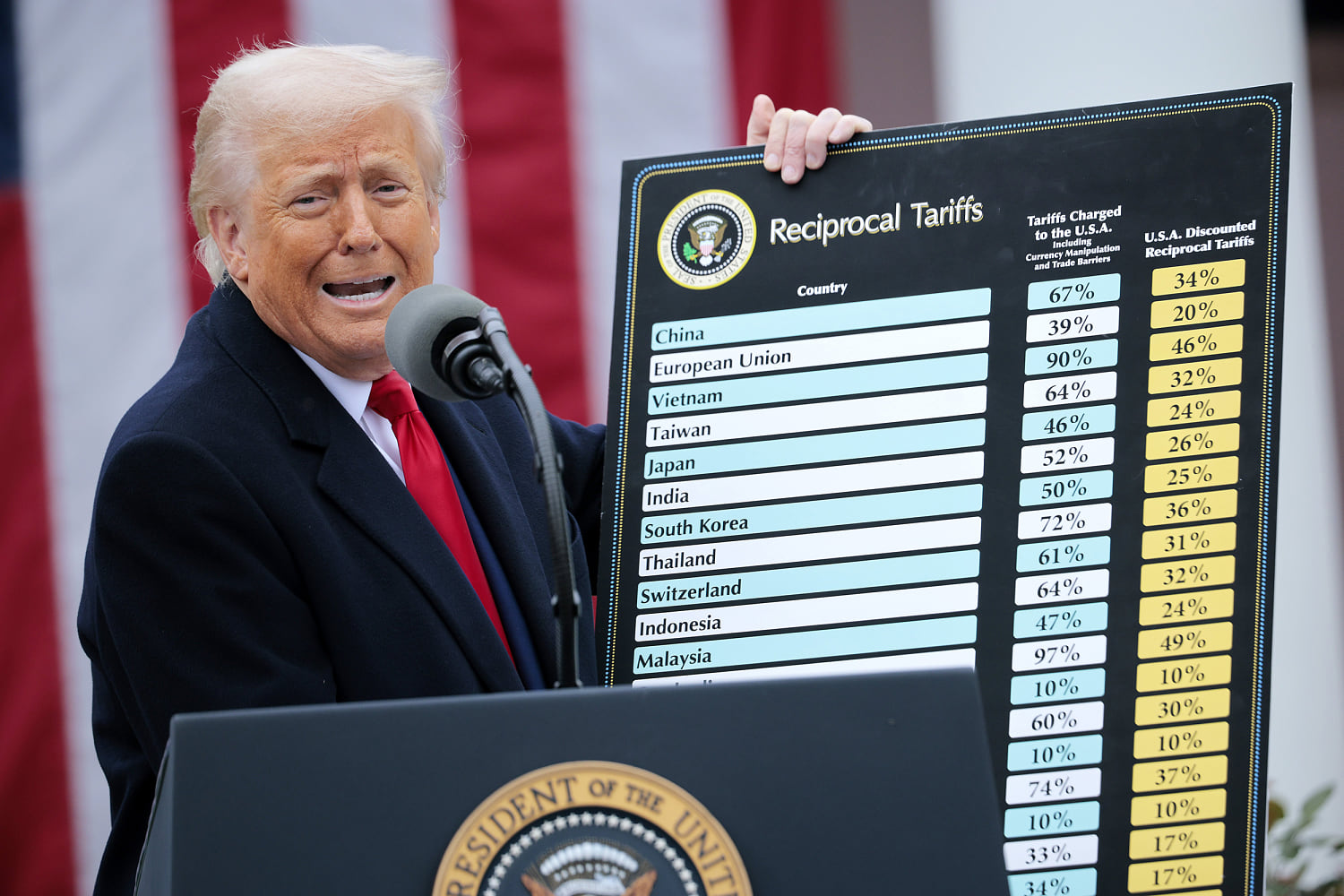
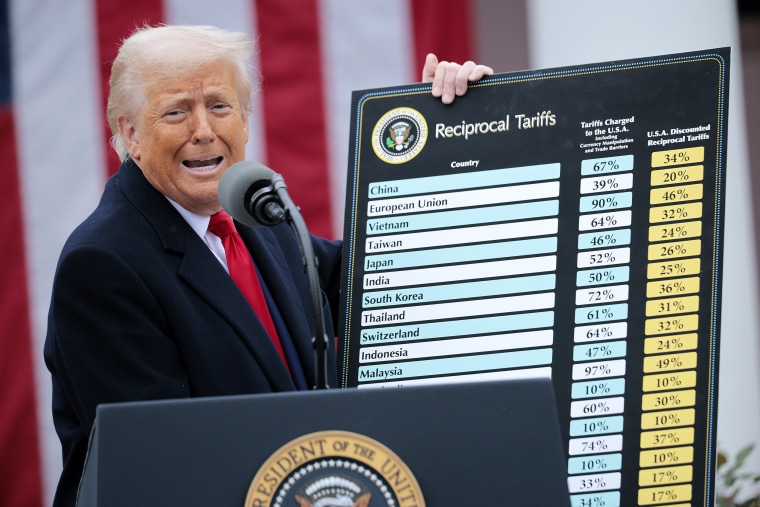
A federal appeals court ruled against President Donald Trump’s tariffs on Friday, but the ruling won’t take immediate effect because the court is giving the administration time to appeal to the Supreme Court. So as with nearly every big issue in American life, the justices may have the last word.
Attorney General Pam Bondi said the administration will appeal. The president said in his own social media post that if the ruling stands it would “literally destroy the United States of America.”
The ruling came Friday from the U.S. Court of Appeals for the Federal Circuit. It dealt with five executive orders imposing tariffs “of unlimited duration on nearly all goods from nearly every country in the world,” as the court put it. The U.S. Court of International Trade had previously ruled in May that the tariffs ran afoul of a federal law called the International Emergency Economic Powers Act (IEEPA). The government appealed to the Federal Circuit, which upheld the trade court on Friday.
“Because we agree that IEEPA’s grant of presidential authority to ‘regulate’ imports does not authorize the tariffs imposed by the Executive Orders, we affirm,” the appeals court said, adding that it wasn’t weighing in on “whether the President’s actions should have been taken as a matter of policy.”
The court also said that further review is needed back in the trade court regarding the universal injunction it granted. The appeals court cited the Supreme Court’s ruling in the birthright citizenship case that dealt with that subject in June, after the trade court ruling came out.
The Federal Circuit’s ruling on Friday split the 11 judges who heard the case 7-4.
The judges also issued an order accompanying the ruling that keeps it from taking effect through Oct. 14. If a Supreme Court appeal is filed by then, the appellate ruling will remain on hold either until the Supreme Court declines review or issues its own ruling.
Four judges added a separate opinion that agreed with the majority, but further expressed their view that IEEPA not only doesn’t authorize Trump to issue the tariffs in these executive orders, but that it doesn’t authorize him to issue any tariffs at all.
Four other judges dissented, writing that they agreed with the majority that the trade court had jurisdiction, that the plaintiffs had standing to bring a lawsuit and that (if the tariffs are unlawful) the case needs to be sent back to the lower court for further review; but they disagreed with the substance of the lower court’s ruling that the tariffs are unlawful.
Subscribe to the Deadline: Legal Newsletter for expert analysis on the top legal stories of the week, including updates from the Supreme Court and developments in the Trump administration’s legal cases.
Jordan Rubin is the Deadline: Legal Blog writer. He was a prosecutor for the New York County District Attorney’s Office in Manhattan and is the author of “Bizarro,” a book about the secret war on synthetic drugs. Before he joined BLN, he was a legal reporter for Bloomberg Law.
The Dictatorship
A teenager died by suicide after confiding in ChatGPT. That should be a wake-up call.

In family photos, you can see 16-year-old Adam Raine grinning ear to ear. But the California teen’s prankster personality concealed a deep current of depression and despair. And earlier this year, say his parentsChatGPT — which Adam went to for comfort — helped him take his own life.
Earlier this week, Adam’s mother and father filed the first known wrongful death suit against OpenAI. The lawsuit includes ChatGPT logs from Adam’s phone, which show how completely he was lured in to rely on a Big Tech product for companionship — and how, time after time, that product ignored warning signs and structurally failed him. At first, he turned to AI for homework help. Then, as chronic illness and problems at school narrowed his world, he called on it for comfort. Instead, the lawsuit alleges, it became an accelerator for self-harm and guided him through his death by suicide. (In a statement to NBC News, an OpenAI spokesperson confirmed the authenticity of the logs, but said the lawsuit did not include the full context of ChatGPT’s responses.)
Chatbots are designed to keep kids hooked — even when they need off-ramps for real-world help.
As the mother of two boys, 3 and 5, I can only imagine the pain Adam’s parents are feeling. But I know that families across the country share a fundamental anger that Big Tech companies willingly risk the lives of our kids, an anger that grows every time we hear about the loss of a young person like Adam.
More and more frequently, kids are confiding in Big Tech’s AI chatbots, not just when they want help with homework, but when they’re lonely or in pain. Because AI chatbots are designed to be sycophantic and to adeptly mimic human emotion, children can’t always tell truth from fiction, or distinguish real love and concern from a machine-generated response. That makes kids dangerously vulnerable to forming unhealthy attachments.
After the Raines filed their lawsuit, an OpenAI spokesperson said the company was “deeply saddened by Mr. Raine’s passing.” The company published a blog post listing “some of the things we are working to improve” when ChatGPT’s safeguards fail. That is too little, too late — just like Big Tech’s attitude toward safety in general. Rather than do anything to help address this problem, these companies prioritize hyping up the uses of AI and increasing its “market share” of our kids’ waking hours and mental bandwidth.

In fact, Mark Zuckerberg has said he wants his Meta AI companion to fill users’ “demand for meaningfully more” real-world friends. In 2023, The Wall Street Journal reportsthe chatbot’s product managers “told staff that Zuckerberg was upset that the team was playing it too safe,” which led to a loosening of the standards that kept conversations from becoming too sexualized.
Meta’s internal documents allowed their AI chatbots to “engage a child in conversations that are romantic or sensual” until the company was asked about it by Reuters. New research from the family advocacy group Common Sense Media finds that Meta’s chatbot for Instagram and Facebook willingly coaches teens on how to carry out self-harm, disordered eating and violent fantasies.
As AI chatbots become confidantes and even parasitic bosom buddies, many children share secrets they won’t or can’t tell their families. Chatbots, though, are designed to produce engagement and keep kids hooked — even when they need off-ramps for real-world help. Products like ChatGPT — tragically, unspeakably — become abettors and co-conspirators in suicidal plans, with the chatbot, according to the lawsuit, even providing Adam advice on how to tie a noose.
If this were any other industry, lawmakers would have listened to the thousands of parents and young advocates who have been banging down their doors pleading for change.
The scale of the harm wrought by these companies grows by the day.
But Big Tech has big money, which means big lobbying — and so far, that has blocked real safeguards. Instead of working with lawmakers, these companies even pushed for a ludicrous federal moratorium on AI regulation, which would have negated hundreds, if not thousands, of state laws already on the books and blocked any state laws dealing with AI for 10 years. This prompted a nationwide revolt of parents, attorneys general, governors and state legislators on both sides of the aisle.
My two boys haven’t yet begun to ask me for phones, and they don’t know what social media or chatbots are. And still I’m scared to death we won’t get through to lawmakers in time to save them. My eldest is a whip-smart, sensitive kid, who I’m terrified will be destroyed by social media, either preyed upon by an online child predator, or persuaded to do himself harm because his young mind won’t comprehend that the “friend” he is confiding in is actually a machine humming away in a massive data center somewhere, helping him — like it did for Adam — plan a “beautiful suicide.”
Meanwhile, tech giants are buying off academics and whitewashing research about the dangers their products pose to our kids. They’re infiltrating trusted institutions like the PTA, backing “safety” initiatives while fighting to defeat safety reforms, suing organizations they view as threats. They try to silence whistleblowers — even when those whistleblowers are called before Congress. And now they’re even creating political super PACs to intimidate lawmakers into voting their way and ignoring tragedies like Adam’s.
Let me be absolutely clear: Politicians should think twice before accepting donations from these Big Tech super PACs. The scale of the harm wrought by these companies grows by the day. They are not working in good faith with legislators and regulators to ensure that our privacy and our children’s lives are protected.
Thankfully, state legislators don’t have to wait for Washington to act. In California, for instance, state Sen. Steve Padilla introduced SB 243which would establish safety guardrails for “companion” chatbots and make companies track interactions with users in crisis. And AB 1064the LEAD for Kids Act, championed by Assemblymember Rebecca Bauer-Kahan, would ban emotionally manipulative AI companions for kids, require parental consent and more.
These are all sensible measures — and they are under attack by the very companies whose products are harming our children. Just last week, Meta announced a California-specific super PAC to go after such bills.
Meta, Apple, Google, OpenAI and their ilk will never regulate themselves, so we urgently need to do it before more children die and more families are destroyed. In Adam Raine’s memory, we have an opportunity to prevent future tragedies — if lawmakers will listen.
-
Uncategorized10 months ago
Bob Good to step down as Freedom Caucus chair this week
-

 The Josh Fourrier Show10 months ago
The Josh Fourrier Show10 months agoDOOMSDAY: Trump won, now what?
-

 Politics10 months ago
Politics10 months agoWhat 7 political experts will be watching at Tuesday’s debate
-

 Politics6 months ago
Politics6 months agoFormer ‘Squad’ members launching ‘Bowman and Bush’ YouTube show
-

 Politics10 months ago
Politics10 months agoHow Republicans could foil Harris’ Supreme Court plans if she’s elected
-

 The Dictatorship6 months ago
The Dictatorship6 months agoPete Hegseth’s tenure at the Pentagon goes from bad to worse
-
Economy10 months ago
Fed moves to protect weakening job market with bold rate cut
-

 Politics10 months ago
Politics10 months agoRFK Jr.’s bid to take himself off swing state ballots may scramble mail-in voting




